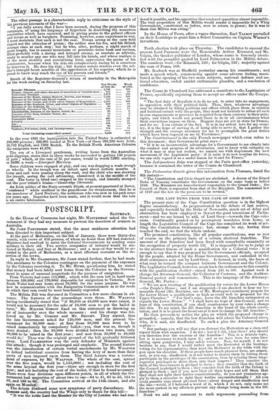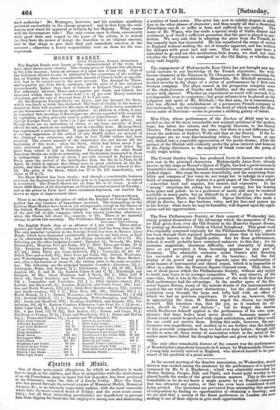THE LAST NEWS FROM THE CAPE OF GOOD HOPE.
The present state of the Cape Constitution question is in the highest degree unsatisfactory. As prognosticated in the debate of last session, and especially foretold by the Duke of Newcastle, much art of delay and obstruction has been employed to thwart the good intentions of Parlia- ment—and we are bound to add, of Lord Grey—towards the Cape colo- nists. Continually goaded on by peremptory mandates from home, at length the Legislative Council of the Cape has completed its work of set- tling the Constitution Ordinances ; but, strange to say, having thus reached the end, we find the whole undone.
The promised constitution, like all popular constitutions, was to rest of course on the primary basis of a certain electoral franchise. The amount of that franchise had been fixed with remarkable unanimity as the occupation of property worth 251. It is impossible for us to judge as to the abstract fitness of such a qualification for a Colonial voter : it is enough to say that it was proposed by the Government officials, accepted by the people, adopted by the Home Government, and embodied in the draft ordinances sent out by Lord Grey. It formed, in truth, the basis of what may be termed the compact between Government and the Colony. The Legislative Council, however, sends back the ordinances to this country
with the qualification doubkd—raised from 251. to 501. Against such a change the Attorney-General, the Collector of Customs, and the Auditor- General protest and remonstrate. This is the language of the Attorney- General, Mr. Porter-
" We are now treating of the qualification for voters for the Lower House —the People's House ; and I am staggered—I am shocked to hear my ho- nourable friend (Mr. Hawkins, one of Mr. Montague's nominees) propose for the Lower House a qualification as high as could well be proposed for the
Upper Chamber." For God's sake, leave the 25/. franchise unimpaired as
regards the Lower House." "I shall have no hope of this Council, and no hope of this constitution, if you shall countenance by your votes a change like this. To my mind, the 251. franchise is the heart of the whole consti-
tution, and it is to pluck the heart out of it now to-change the 251. franchise." He then proceeds to notice the plea on which the proposed change is grounded,—namely, that the low franchise will admit the Coloured races, who, it is said, are disaffected. To such a plea the Attorney-General replies— "But perhaps you will say that you distrust the Hottentots as a class, and regard them with suspicion. I do not ; but if I did, what then ? why should you therefore fear the exercise of the franchise ? This is a delicate topic, but it is necessary to touch upon it ; and as we have been for some time sitting upon gunpowder, I may safely venture. Now, for myself, I do not hesitate to say, that I would rather meet the Hottentot at the hustings voting for his representative, than meet the Hottentot in the wilds with the gun upon his shoulder. If these people have much physical force, are armed, and, as you say, disaffected, is it not better to disarm them by letting them participate in the privileges of the constitution, than by refusing those long- expected privileges to drive them into their laagers ? They consider the faith of the Government is pledged to them ; they consider that the faith of the Council is pledged to them ; they consider that the faith of the Colony is
pledged to them and if you now blast all their hopes and tell them that they shall not fight their battles constitutionally, do you not yourselves ap-
ply to them a stimulus to fight their battles unconstitutionally ? All you could possibly urge about physical force—about danger and disaffection and the like—would, if I believed a word of it, which I do not, only make me the more earnest in my efforts to prevent any change being made in the 25/. franchise."
Need we add any comment to such arguments proceeding from
such authority ? Mr. Montague, however, and his nominee members, persisted successfully in the change proposed : and in that form the ordi- nances now stand for approval or revision by her Majesty. What course will the Government take ? The only course open to them, consistently -with good faith and regard to the peace of the colony, is to restore (as they have the power of doing) the franchise to its original amount, and in that shape to give their final and immediate sanction to the measure ; otherwise a heavy responsibility rests on them for the con- sequences.



























 Previous page
Previous page